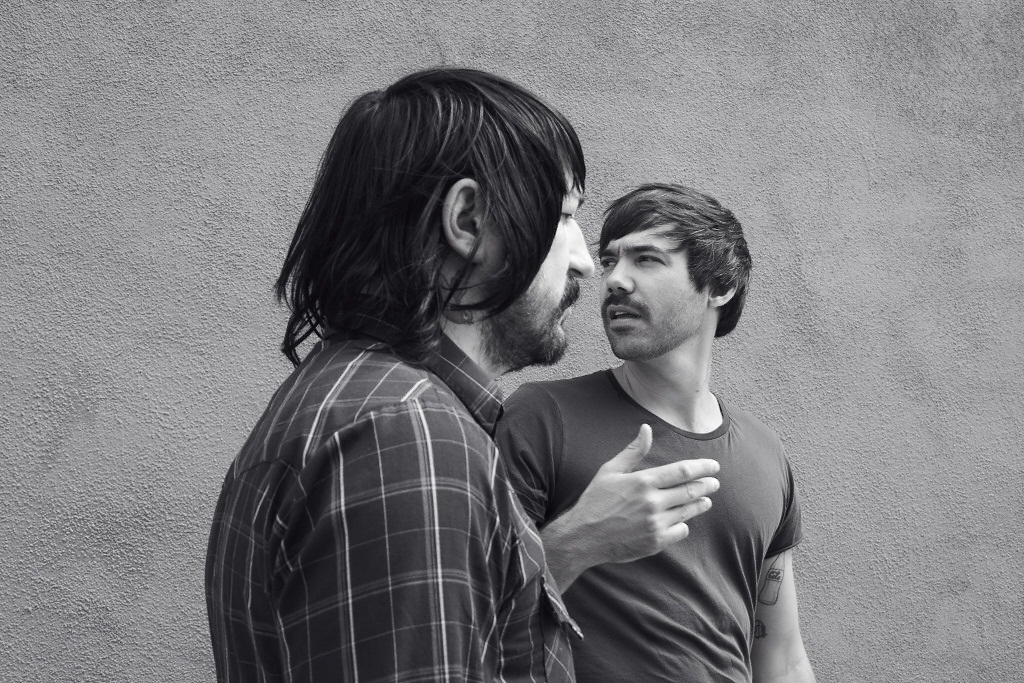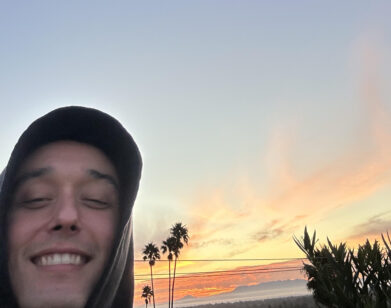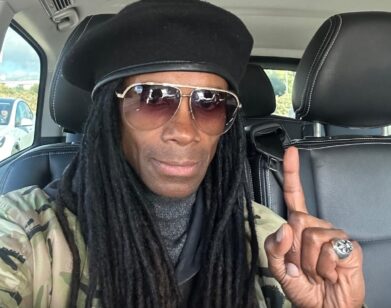Death from Above 2014

ABOVE: DEATH FROM ABOVE 1979’S JESSE KEELER (LEFT) AND SEBASTIEN GRAINGER. PHOTO COURTESY OF PAMELA LITTKY
Back in 2004, Jesse Keeler and Sebastien Grainger were at the height of their careers as Death From Above 1979. Two years later, the band ceased to exist, leaving fans only You’re A Woman, I’m A Machine—the duo’s sole record. Now, Keeler and Grainger have reunited a decade since their first album debuted—leaving all of the bad stuff behind and bringing their mix of punk, prog-rock, and dance music to new and old fans alike. During the past 10 years, Keeler and Grainger worked on their own respective musical projects—Keeler as MSTRKRFT and Tellier making music as The Rhythm Method and under his own moniker.
With their sophomore effort The Physical World, Death From Above 1979 picks up right where they left off: the band used their debut record as their main musical influence, creating a sense of familiarity for listeners. We caught up with Jesse Keeler about the band’s falling-out, treating the band as another person, and not “disliking” the idea of Death From Above 1979 anymore.
ILANA KAPLAN: It’s obviously been a long time since you guys released your first record. What made you decide to create a new one after so much time passed?
JESSE KEELER: Once we got back together at the end of 2010, we played shows for pretty much all of 2011, but they were always reunion shows. I think at some point, we decided that we didn’t want to keep playing. We couldn’t be on an endless reunion tour. We decided that if we were going to keep playing we had to make new music or stop playing.
KAPLAN: Why did you guys never make a sophomore record sooner?
KEELER: Well, our band broke up in 2005, and I didn’t see or hear from Sebastien for five years. I was just busy doing stuff—as was he. I guess one day he realized, “I don’t dislike the idea of that band anymore.” He emailed me to see if I didn’t “dislike” the idea as well. So we got together and started playing.
KAPLAN: Interesting. Was it an amicable breakup at the time?
KEELER: We had both gotten pretty tired of doing what we were doing. It just seemed like we didn’t know what the future was for it and we lost sight of the vision for it, really. We both shut down in our own ways. We dealt with it in opposite ways. It was done, and Sebastien told me he didn’t want to do the band anymore. We spoke about it for a bit, and I said “sure,” because it gave me an out as well. We still played all the shows we had booked, and we decided to stop before we finished the shows that we played.
KAPLAN: What’s been the most exciting thing about reuniting this time around?
KEELER: In our absence, we gained all of these new fans. I don’t think either of us really had a sense of that or knew that had happened. It was shocking in the nicest way, to suddenly be able to do the stuff we weren’t able to do the first time around. That was probably the most shocking, surprising, and nicest thing. From that, all of our record relationships are smoother. I think in our absence we became much more of a brand than we were before.
KAPLAN: I wore your t-shirt until the silkscreen came off. [laughs]
KEELER: Well, if you’re interested in purchasing another one, there are more. [laughs]
KAPLAN: I am definitely into that idea. What’s the biggest difference in your sound from then and now? Is there something fans will notice?
KEELER: Well, we’re recorded much better on this record—very differently. I don’t think it’s better or worse; it’s a much different recording. We’re actually still using all the same stuff. I still use pretty much all the same gear. Our band is sort of trapped in the form that we are in the bass-drums setup. I think that holds the band to a certain sound. The band sounds better than the last one in some ways, different in other ways, but it still very much sounds like our band. The band has become a third person for us both now. If I speak about it in the third person, that’s just the way it is for us.
KAPLAN: The singles you released so far are very thrash heavy and prog-rock-oriented, much like your first album. Did you guys decide to take on other genres on this record?
KEELER: I think our thought was that we would leave other ideas—ones that are too far outside of what the band is—alone or address them with other projects that we have, rather than force all of our ideas into the one box. It’s easier now because the band has existed for so long without us, it’s easier to know what the band is. Last time around, whatever Sebastien and I made together was Death from Above, but this time Death From Above, since we left it, continued to live, whatever that is. I think we feel the same way about our band as our friends do. I think we’re servicing this thing we built—not trying to create it out of thin air as we did in the past.
KAPLAN: Is it kind of weird to have had that legacy after one album?
KEELER: Yes. I don’t have any experience with it different than that. I guess with MSTRKRFT there’s a certain legacy in it for me. It’s strange—it’s a nice thing. The ability to walk into a record label and tell them what we want to do and they all just say, “Yes, that sounds great,” as opposed to 12 years ago, walking into a record label, telling them what we want to do, and them saying, “I don’t think anyone is going to like that.” We had to prove our concept back then, but now it’s smooth. Long ago, we showed up cap in hands asking someone to believe in us. It was a very different time.
KAPLAN What were you guys listening to when recording the album?
KEELER: We’ve kind of just been influenced by our own band now, in terms of recording stuff. There are things I didn’t fully realize from the first album in terms of recording. The first album we didn’t know what we were aiming at. I’m happy with how it ended up, but being critical, we had a bunch of technical things we were aiming for with this one. It wasn’t like a musical thing that we were influenced by, but more sounds, tones and feels in certain things. We were trying to see if we could apply those things to what we were doing. In the end, I listen to it and I’m like, “This sounds like our band.”
DEATH FROM ABOVE 1979’S SOPHOMORE RECORD THE PHYSICAL WORLD IS OUT TODAY. FOR MORE ON THE DUO, PLEASE VISIT ITS WEBSITE.






